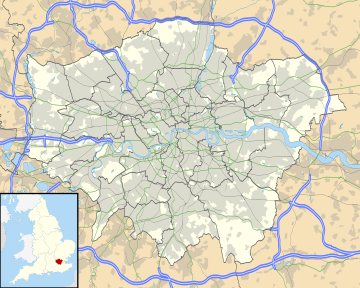Crews Hill is an elevated and green-buffered former hamlet grown into a small village-size community on the northern outskirts of London centred 12.3 miles (20 km) north of Charing Cross. It forms part of the London Borough of Enfield and economically has many garden centres and plant nurseries. It is the northernmost settlement in the entire county of Greater London bordering the M25 and the Welwyn Hatfield district of Hertfordshire to the north; it was historically part of the county of Middlesex.
| Crews Hill | |
|---|---|
 Image of Crews Hill | |
Location within Greater London | |
| Population | 566 [1][note 1] |
| OS grid reference | TQ315995 |
| London borough | |
| Ceremonial county | Greater London |
| Region | |
| Country | England |
| Sovereign state | United Kingdom |
| Post town | ENFIELD |
| Postcode district | EN2 |
| Dialling code | 020 |
| Police | Metropolitan |
| Fire | London |
| Ambulance | London |
| UK Parliament | |
| London Assembly | |
Etymology
editNamed from its association with the Crew family, mentioned in local records of the mid-18th century.[2]
Transport
editCrews Hill is served by Crews Hill railway station with trains to Hertford North, Stevenage, in the north, and Moorgate in the south. Starting in 2021, bus route 456 connects Crews Hill to the North Middlesex Hospital via Enfield Chase and Winchmore Hill.[3]
Demography
editCrews Hill is part of the large Chase ward, which also covers Botany Bay, Clay Hill and Bulls Cross. The 2011 census showed that 77% of the ward's population was white (64% British, 11% Other, 2% Irish). 5% was Black African and 3% Black Caribbean.[4]
Places of interest
editNearby, there is Crews Hill Golf Course, which dates from 1916. John White, the Tottenham Hotspur and Scotland national football team player, was killed by lightning while sheltering under a tree at the golf course on 21 July 1964.
On Whitewebbs Lane there is the Whitewebbs Museum of Transport.
Further up the road is Whitewebbs Park. This is a country park and includes the Enfield Municipal Golf Course.
Crews Hill originally had a large area of glasshouse production, to serve the nearby London market with cut flowers, pot plants and vegetables. As this became less economic, these sites transformed into a number of garden centres and retail nurseries. Describing the horticultural output of Crews Hill, journalist Ian Jack wrote: "The greenhouses at Crews Hill ('Britain's horticultural mile') used to supply London with flowers and salads. Then came garden centres. Now there are warehouses filled with flowers, chilled at a permanent 7C, the same temperature that has kept them fresh in the six-hour lorry and rail journey through the tunnel from the auctions in Holland."[5]
Turkey Brook flows through Crews Hill.
References
edit- ^ "Neighbourhood Statistics 2011". Office for National Statistics. 31 January 2013. Archived from the original on 11 February 2003. Retrieved 30 July 2015.
- ^ Mills A. D. Oxford Dictionary of London Place Names (2001) p59 ISBN 0-19-860957-4 Retrieved 30 October 2008
- ^ "Bus changes (archived)". TfL. Archived from the original on 23 March 2021. Retrieved 10 February 2022.
- ^ "Chase - UK Census Data 2011".
- ^ Jack, Ian (16 February 2008). "How roses got caught between the supermarkets and the greens". theguardian.com. Retrieved 28 March 2014.
Note
edit- ^ Figures shown are for 2011. Please note the population derived from adding Area: E00007030 (Output Area) and Area: E00007032 (Output Area), the latter of which also includes part of Clay Hill
